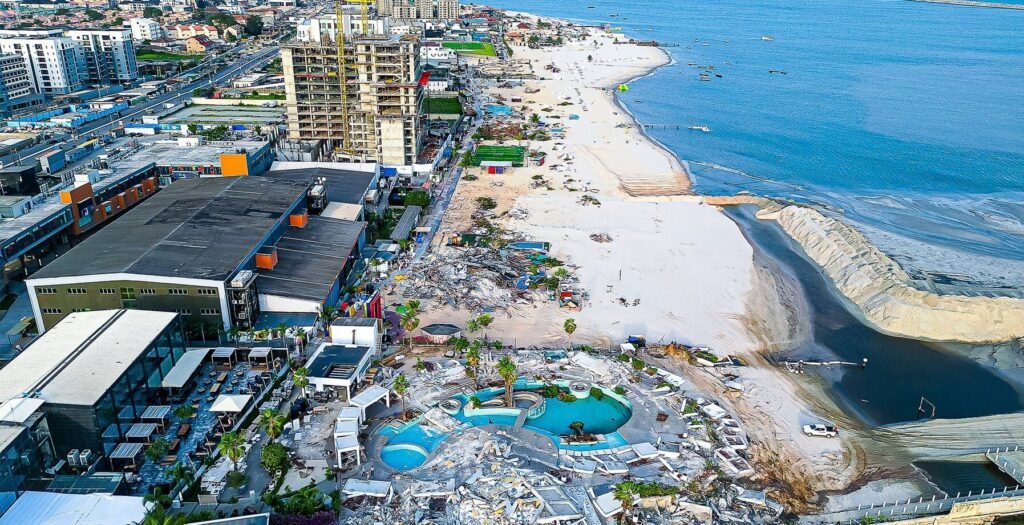The demolition of the Landmark Beach front in Lagos is prompting some businesses to reconsider their investment strategies in Nigeria, with some considering scaling back their investments or relocating to other regions, according to a recent report. The report, titled “Nigeria Real Estate Market Review H1 2024” and published by Northcourt, highlights how rising inflation rates are driving up construction costs, challenging the feasibility of new real estate projects, and ultimately slowing down development.

The report notes that the Landmark Group, led by Paul Onwuanibe, received a government notification that the Landmark Beach resort would be demolished due to its proximity to the proposed 700-kilometer Lagos-Calabar coastal highway. The Landmark beach, valued at an estimated $200 million, is a significant contributor to tax revenue, with estimates around $1.5 million annually.
The demolition has raised concerns among investors, some of whom are now considering reducing their investments in Nigeria or redirecting them to other African countries. The report also highlights how this incident has further damaged Nigeria’s reputation for policy inconsistency and insufficient stakeholder consultation.
Landmark Group continues to advocate for a reconsideration of the highway route to minimize the negative impact on local businesses and the environment. Analysts emphasize the importance of sustainable urban development and the need for eco-friendly urban settlements in the planning process.
Additionally, the report underscores the impact of high inflation rates, which reached 33.95% in May, on consumer purchasing power and the real estate market. Inflation has significantly increased construction costs, leading to project viability challenges and a reduction in new developments. Year-over-year, construction costs have surged by over 78%, while rents are rising in low-income areas, sparking renewed calls for affordable housing.
Nigeria’s real estate market has also been affected by unfavorable exchange rate fluctuations and inflation, creating challenges for developers and investors. These economic conditions have hindered the ability to import construction materials and equipment, resulting in project delays and escalating costs.
However, the report also mentions government interventions aimed at lowering construction costs, providing tax rebates for construction companies, and supporting the local production of building materials. Commenting on the report, Northcourt CEO Ayo Ibaru noted that the real estate sector contributed 5.20% to Nigeria’s GDP in Q1 2024, down from 5.31% in Q1 2023.
Ibaru pointed out that poor economic performance has created unfavorable business conditions, leading to a decline in Foreign Direct Investment (FDI) in Nigeria, which in turn limits the availability of capital for real estate and construction projects. Despite this, population growth continues to drive demand for residential real estate, particularly in mid-market areas.
The report also highlights the ongoing demand for affordable housing and sustainable building practices, which has led to a mismatch between supply and demand. Ibaru projected that Nigeria’s real estate market could grow by 7.24% and reach an estimated value of $2.14 trillion by the end of 2024, with residential real estate holding the largest share, estimated at $1.77 trillion by the end of the year.
Although The Economist reported that 70% of the buildings required by 2040 have yet to be constructed, the Northcourt report emphasizes the challenges facing the Nigerian real estate sector, such as obtaining long-term financing on favorable terms. The report also mentions complications related to the Land Use Act of 1978, which has not yet been reviewed and makes financing difficult.
Additionally, the limited availability of mortgages due to high rates and lack of collateral means that only a small percentage of the population can access them. While cooperative societies are making some progress in raising funds for housing, these efforts are still insufficient to address the broader housing needs. Large-scale housing developments in Nigeria remain largely in the planning and early execution stages.








